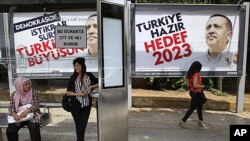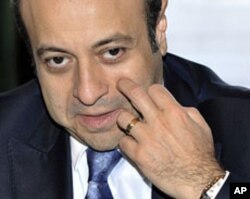The incumbent Justice and Development Party - or AK Party as it is known in Turkey - is looking forward to winning a third term in the general elections on Sunday. The party launched their election campaign with the slogan, A Vision for 2023. 2023 is the centennial of the Turkish republic. In an exclusive interview with the VOA Turkish Service, Minister for EU Affairs and Chief Negotiator Egemen Bagis, one of the party leaders, said that Turkey’s biggest issue is democratization.
He says progress in the democratization process would help solve other political, social and economic problems.
“Traditionally Turkey’s biggest problem is the struggle between the political will of the people or its representatives and the political will of those who have been appointed in the state. As long as this struggle isn’t resolved other daily problems such as unemployment, economic problems, counter-terrorism, concerns on rights and freedoms continue," he said.
"The Justice and Development Party - which rose to power in 2002 and consolidated its power in 2007 - is determined to put the people in charge in 2011. We are determined to take the most important institutional step to empower the will of the people,” he added.
“For the first time in our history we will take the steps necessary to draft a constitution written by elected civilians. The incumbent and the opposition agree that in this country we do not want a constitution drafted by the military; but a civilian constitution. We will take the necessary steps to draft a constitution that every citizen can own, a constitution that will embrace every citizen,” said Minister Bagis - referring to the new Constitution the JDP government hopes to draft.
Democratization
Bagis, a member of parliament representing Istanbul, says that democratization is Turkey’s number one priority. However, the opposition in recent times has been arguing that Prime Minister Recep Tayyip Erdogan’s government is increasingly authoritarian and illiberal in its policies. Bagis rejects the claim that authoritarianism is on the rise in Turkey.
“Turkey has never been so transparent," said Bagis. "There used to be taboos in this country. Ten years ago people were afraid to say they were Kurdish. Today the state television broadcasts Kurdish language programming 24 hours a day. Today, Turkish universities have Kurdish studies departments. There is a prime minister that dines with Alevi citizens, a president who has visited a Cemevi for the first time since Ataturk."
"One can freely discuss civil-military relations in Turkey today, you would be afraid to in the past. Religious differences were avoided in Turkey in the past, but now you have an EU Affairs Minister that regularly meets with minority religious leaders. Now, I know that we have some problems, some that take some more time to resolve. But we’re working on this. Following our apprentice period, we are in our professional time - and we can solve Turkey’s chronic problems, we have proven that we can solve them,” he added.
The JDP election manifesto states “Our goal is to make Turkey one of the top 10 economies of the world; with $500 billion in exports; $2 trillion national income; a country at peace with its history and values; with a population that is [...] happy by the year 2023.”
'Economic growth, political stability'
Following the 2001 financial crisis in Turkey an IMF supported reform program laid the foundations for sustained growth in the Turkish economy. Until 2008 Turkey enjoyed an average of six percent annual growth and thanks to a strong banking sector the economy faired relatively well during the global financial crisis. A new middle class emerged in Turkey - especially in Anatolia. Inflation declined to its lowest levels in 30 years.
However, at the same time Turkey has a serious current accounts deficit problem; demand for hot money is a cause of concern and unemployment is a serious problem. Official figures indicate that unemployment is around 12.4 percent; 17 percent of the population lives below the poverty line.
Bagis says that for economic growth, political stability is a must.
“Unemployment is not just a problem for Turkey but for Europe at large and for the United States. However, our unemployment rate is below the average of the European unemployment rate. There are European countries with 20 percent unemployment. While banks were going bankrupt in Europe and the U.S., not a single Turkish bank in the past nine years suffered a loss. Unemployment is on the decline," he said.
"Yes, it hovers around 10 percent, but our vision for 2023 to bring unemployment below five percent is very strong. God willing, we will bring unemployment lower by taking the necessary steps in the period ahead of us. To create jobs for our unemployed brothers and sisters we must have stability. No one will invest in a country where there is no stability; and there will be no employment in a country that is not invested in…"
"Since we paid attention to stability and security; $17 billion of global capital was injected in Turkey annually. After the June 12 elections, with four more years of stability, Turkey will become like Brazil, China and Russia in terms of foreign capital investment. And this will bring employment [down],” he continued.
'Turning point'
Minister for EU Affairs, chief negotiator and Istanbul deputy Egemen Bagis said that the June 12 elections will be a turing point for Turkey.
“Turkey, with its 8.9 percent growth rate is the most dynamic European country. With our highly educated, young population - coupled with our economic growth - Turkey will become one of the rising stars of the world,” he said.
The ruling Justice and Development Party hopes to secure 40 - 46 percent of the national vote in the elections on Sunday.





